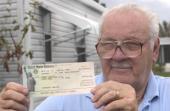
 Donald Seither photo by: Scott Martin/Associated Press
Donald Seither photo by: Scott Martin/Associated Press
Donald Seither of Punta Gorda holds his FEMA check for $1.69. Rather than cash it, he says, he's considering auctioning it on eBay. About a week later, a check from the U.S. Treasury came in the mail. Here, Seither figured, was the hundreds, maybe thousands, of dollars he and his wife would need to help rebuild their lives. Then he opened the envelope and read the fine print. The check's value: $1.69.
It turned out Seither and his wife didn't appear to qualify for major federal assistance because they had insurance coverage. But rather than reject them outright, FEMA says it is giving them, and several other hurricane victims, token sums instead. It's a quirk in a system intended to provide serious relief for those whose lives have been disrupted or destroyed. FEMA says for many, a small sum is better than nothing. "I know $1.69 sounds ridiculous, but if the guy seems entitled to it, we're going to cut the check," said Butch Ducote, a FEMA spokesman. Seither is not alone. Ducote said FEMA has received a handful of calls from other puzzled victims with small checks, though he could not say how many have been issued. "I can assure you that checks that small rarely happen, but it does show you the effort," Ducote said.
The token relief carries an unintended consequence. For residents who spent much of the past two weeks living amid rubble without electricity, it can feel less like help and more like a slap in the face. "I fell to the floor and I started to cry," said Seither, recalling his disappointment when he opened the envelope. He said he and his wife still live in the mobile home, which sustained roof and siding damage and had a tree jutting through a window after the storm.
FEMA, which provides financial support for the uninsured and underinsured in the aftermath of major disasters, says it has written nearly 42,000 checks worth more than $68 million to victims since Hurricane Charley nailed southwest Florida on Aug. 13. That money has gone a long way toward helping tens of thousands with everything from home repairs to replacing damaged furniture and paying for clothing and medical care.
About 70 Floridians have qualified so far for the maximum FEMA award: $25,600. But at the other extreme are people like Seither. When he opened his envelope and called FEMA in a rage, someone told him the money was provided so he could buy a gallon of gas for his generator. "I said, 'Evidently you don't live in Florida,' " Seither said. "Because gas here is $1.83." He said he's not ungrateful but can't believe the federal government would go to the trouble to mail him a check for such a pittance. "It's an insult," he said. "I would rather have gotten nothing."
Such was his anger that he took the check to a local radio station and railed against the federal agency on the air. Seither's plight came to the attention of local FEMA officials, who found his case bizarre and decided to investigate. "At first people thought it was just a misplaced decimal point," said FEMA spokesman Doug Welty. "But this was in fact a legitimate check." Welty said it was impossible for him to say why a FEMA official decided to award Seither the exact amount he received. Aid requests are assessed case by case and are based on several factors, including the extent of a victim's insurance coverage and how much damage he or she can document. In many instances, FEMA officials go to homes to assess the damage themselves. Welty said he understands that receiving such a small check can seem insulting. But he pointed out that the only alternative would be to not send it at all - something sure to raise plenty of ire as well. "If you don't do it, then people get (angry)," he said.
Seither said he's not going to cash his check. He's holding on to it as a novelty item [and] now he's considering auctioning it on eBay. Someone already has offered him $24 for it, he said.
Staff researcher Melanie Mena contributed to this story.